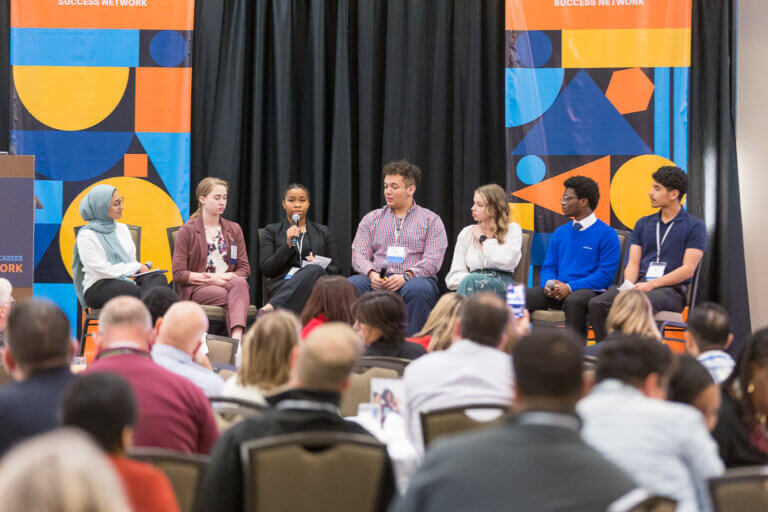Designing and implementing high-quality work-based learning experiences is a daunting task, and there is not always clear support for implementation. From recruiting and preparing employer partners to designing and implementing meaningful hands-on experiences for students to evaluating the outcomes, work-based learning requires an infrastructure not traditionally present or at scale in many schools. Communities that EdSystems works with often grapple with questions such as:
- Should we dive headfirst into hands-on experience, embracing the inevitable trial and error?
- How can we seek the guidance of experienced communities and collaborate with fellow experts in the field?
- What structured training programs and professional development opportunities are available?
Ultimately, communities are likely to engage in all of these areas and more, but one of the ways that people feel most supported is through peer-to-peer learning. Connecting with peers helps people understand they’re not alone in their challenges and creates a space for people to share resources and insights, ultimately supporting the capacity of communities to implement work-based learning.
Because it is a critical component of the College and Career Pathway Endorsement, EdSystems is deeply invested in supporting the scaling of high-quality work-based learning and launched the Illinois Work-Based Learning Innovation Network (I-WIN) to support practitioners.
What is I-WIN?
I-WIN is a community of practice where K-12 school districts, postsecondary institutions, employers, and community-based organizations across Illinois come together to share learnings, as well as a resource hub sharing innovative, scalable, and high-quality work-based learning models. I-WIN originated as an initiative in October 2020, initially responding to the challenges faced by Illinois communities adapting to remote learning while seeking to maintain work-based learning experiences for students. The growing interest in virtual I-WIN convenings underscored a demand for peer-to-peer learning, especially as more districts began prioritizing work-based learning initiatives as they returned to in-person learning.
How Does I-Win Build Connections Among Work-Based Learning Stakeholders?
I-WIN is designed to promote innovative work-based learning models, foster equitable access for historically marginalized students, facilitate community connections to share best practices, and identify areas for state policy improvements or support. To accomplish this, I-WIN:
- Hosts regular virtual convenings to highlight communities, as practitioners share their best practices and resources and engage in discussions with attendees.
- Facilitates roundtable discussions on overcoming challenges in the field, such as student recruitment for job shadows and how AI can be leveraged for work-based learning.
- Provides a continuously evolving resource hub, including sector-specific continuums of resources in education, health sciences, and manufacturing, aimed at inspiring innovative design processes and alleviating the burden on other communities by offering readily available resources.
Regular meetings and a consistently updated resource hub allow communities to access a variety of relevant and timely resources, as well as understand the communities in the state who are available as a resource that they can reach out to.
Replicating the I-WIN Model
At ACTE’s 2024 National Work-Based Learning Conference, I presented the I-WIN model and heard from a number of organizations about their interest in becoming a work-based learning resource hub for their region or state. EdSystems fully supports the expansion of this model and looks forward to learning from and with efforts in other states.
To replicate the I-WIN model, consider:
Who Should Lead Work-Based Learning Networks?
Organizations that serve as intermediaries are a good fit to lead work-based learning networks as they can effectively bridge the gap between educational institutions, industry partners, and community organizations. Intermediaries tend to have expertise in managing multi-stakeholder initiatives and are well-positioned to facilitate collaboration, streamline communication, and ensure equitable access to resources and opportunities.
A state agency can also be a good fit for a lead as it can facilitate partnerships across diverse regions and sectors while also ensuring alignment with educational and economic development goals. Iowa’s Department of Education, for example, provides a robust set of work-based learning resources and consistent channels for communication and collaboration for stakeholders.
What Are the First Steps To Launching a Network?
The best place to start is with a listening tour. Engage a variety of stakeholders to understand the specific needs of education, industry, and community-based organizations in work-based learning. This could look like an informal conversation, focus groups, empathy interviews, surveys, or a combination of engagements. Consider asking stakeholders about their challenges, the questions they’re grappling with, potential equity barriers, and where they see a need for support, in addition to gaining an understanding of their current policies and practices. Based on the stakeholders’ insights, you can begin to design the network’s goals and an initial arc of engagement. The stakeholders can also be your initial coalition to attend and help promote the launch!
Do you have a network like this in your state? If so, we want to hear from you—what aspects do you find most valuable, and what challenges do you face? If not, consider which organization, possibly your own, could take the lead in creating such a network and why it would be well-suited for this role.
To stay informed on I-WIN, subscribe here to our newsletter and join our free virtual convenings (offered during the school year). Looking for more in-depth support on launching a work-based learning community of practice and resource hub? Use the contact form below to get started.


